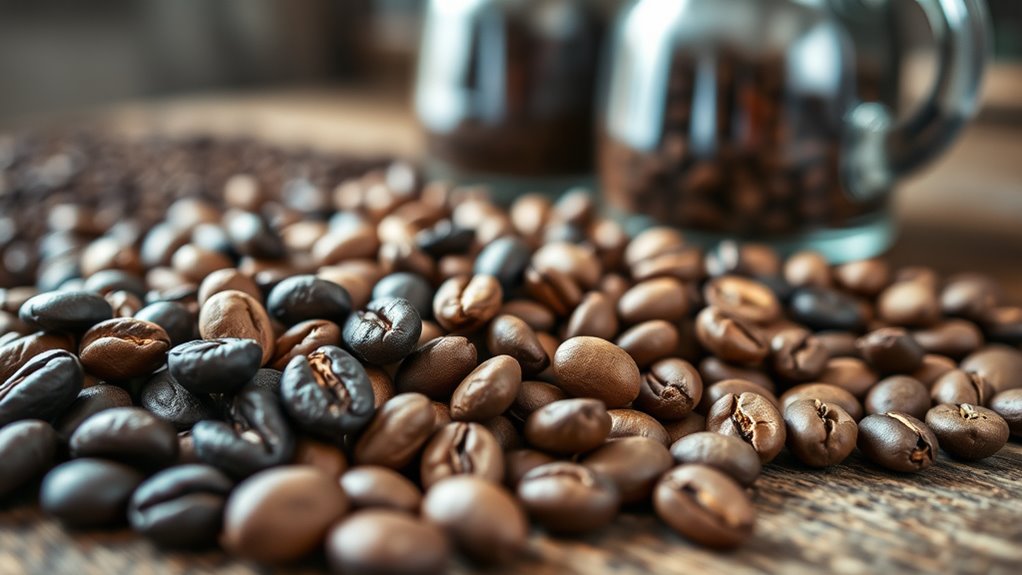For the best cold brew, choose dark roast beans which offer a smooth, rich flavor and deeper notes during long steeping. Opt for whole beans and grind them coarsely just before brewing to preserve freshness and prevent over-extraction. Arabica beans, like Colombian or Brazilian varieties, provide a balanced, less acidic taste, while single origin options enhance flavor complexity. If you want to explore more on selecting the perfect beans, keep going to find out how these choices can elevate your cold brew experience.
Key Takeaways
- Choose dark roast beans for a smooth, rich flavor with bold notes that withstand cold extraction.
- Use whole beans and grind coarsely just before brewing to maintain freshness and prevent over-extraction.
- Opt for Arabica beans, such as Colombian or Brazilian, for a balanced, less bitter taste ideal for cold brew.
- Single origin beans like Ethiopian or Indonesian can add unique fruity, floral, or earthy nuances.
- Combine dark roast with coarsely ground beans and steep in cold water for 12-24 hours for optimal flavor.

When it comes to making the perfect cold brew, choosing the right beans makes all the difference. Dark roast beans are often the top choice because they deliver a smooth taste and a rich flavor that stands out in cold brew. Their roasted profile provides deep, bold notes that don’t get lost during the extended brewing process.
Opting for whole beans is essential; pre-ground coffee can lose its freshness quickly, impacting flavor and aroma. Grinding your beans just before brewing ensures maximum freshness and flavor extraction, especially when using a coarser grind. A coarse grind is vital because it allows water to flow evenly through the coffee during the cold brew recipe, preventing over-extraction and bitterness.
Single origin beans are another excellent option because they showcase unique regional nuances. For example, Ethiopian beans might impart fruity or floral notes, while Indonesian beans like Sumatra Mandheling offer earthy, full-bodied flavors. These distinctive profiles can elevate your cold brew, giving it a more complex and layered taste.
Arabica beans are generally preferred over Robusta for cold brew because they tend to have a sweeter, smoother profile with lower bitterness and acidity. This results in a more balanced, enjoyable drinking experience. Beans like Colombian Supremo or Brazilian Santos are popular choices because they combine boldness with a well-rounded flavor profile, making them ideal for cold brew.
When selecting beans, consider their origin and roast level to match your preferred coffee profile. Dark roast, combined with coarsely ground whole beans, will produce a cold brew with a rich, smooth taste and low acidity. This is especially appealing if you want a less bitter, more mellow coffee.
Follow a cold brew recipe that emphasizes slow extraction over 12 to 24 hours, depending on your taste preference. The brewing method involves steeping the coarse ground beans in cold water, which results in a clean, less acidic brew that’s perfect for hot days or cold mornings.
Frequently Asked Questions
Which Beans Are Best for Cold Brew?
When choosing beans for cold brew, you should look for dark roasts, as they give a smooth, rich flavor with less acidity.
Opt for single origin Arabica beans to enjoy unique regional tastes.
Make sure to grind your beans coarsely to get the best extraction and avoid bitterness.
Fresh, high-quality, and organic beans will also enhance your cold brew’s aroma and flavor, giving you a superior coffee experience.
What Kind of Bean Grind for Cold Brew?
When making cold brew, you want a coarser grind, similar to chunky sea salt. This helps prevent over-extraction, bitterness, and filter clogging.
Aim for a medium-coarse grind, around 7 on a 1-10 scale, to balance flavor extraction and clarity.
Using a burr grinder guarantees your grounds are uniform, which leads to a smoother, more consistent cold brew experience without uneven flavors.
Which Roast Is Best for Cold Brew?
When choosing the best roast for cold brew, you should consider your flavor preferences.
Dark roasts are ideal because their bold, smoky notes shine through during the long steeping process, offering a smooth, rich taste.
If you prefer a more balanced flavor with hints of chocolate and caramel, go for medium roasts.
Light roasts tend to have brighter, more acidic flavors that can be overshadowed in cold brew.
Is Arabica or Robusta Better for Cold Brew?
If you’re choosing between Arabica and Robusta for cold brew, Arabica is generally better. It offers a smoother, sweeter flavor with lower acidity, giving you a mellow, balanced coffee.
Robusta has a stronger, more bitter taste and higher caffeine, which might be too harsh for some.
For a refined, flavorful cold brew, go with Arabica beans—you’ll enjoy a cleaner, more enjoyable cup.
Conclusion
Now that you know the best beans for cold brew, it’s time to start experimenting. Choose beans with rich, chocolatey, or nutty notes for a smooth, satisfying drink. Remember, freshly ground beans make all the difference. Don’t be afraid to try different roasts until you find your perfect cup. With the right beans, your cold brew will be flavorful, invigorating, and just the way you like it. Cheers to your cold brew journey!









